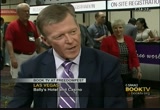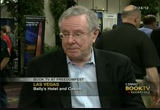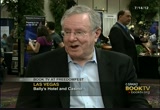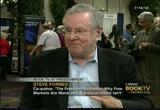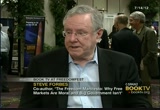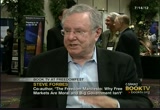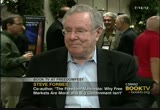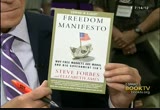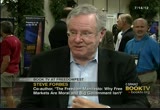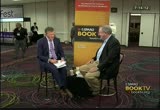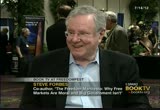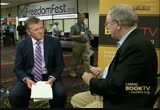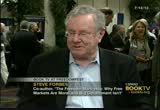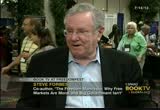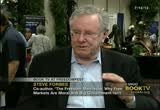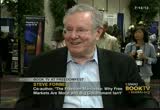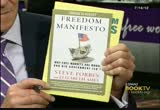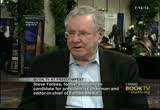tv Book TV CSPAN September 30, 2012 1:15pm-1:45pm EDT
1:15 pm
this is a branch out for you to write about green jobs? >> there is a lot to note, i did a book called overcoming entrepreneurship. i wouldn't say it was a radical change. it's something i have been thinking about and writing about for a long time. >> host: thank you for joining us on booktv. >> guest: thank you for having me on. >> every weekend, we offer 40 hours of programming focused on nonfiction authors and books. watch it here on c-span2. >> host: next, joining us is magazine publisher and author,
1:16 pm
steve forbes. his new book is coming out in august and 2012, and it is called "freedom manifesto: why free markets are moral and big government isn't." we are at freedom-fest in las vegas. mr. steve forbes, why is it that free markets are more government enabled. what is an example of that. >> guest: obviously, functions of government have been big government. but the terms of big government not being moral is the opposite of what it does. it ends up creating the environment where we have less ability to get ahead, it creates dependency, it plays crony capitalism, which hurts career entrepreneurship and opportunity. all the government and what it says it does, helps the poor, make sure that markets on the right direction, they actually do the opposite. they are short-term oriented to
1:17 pm
the next election. they have their own agenda. they don't respond to the marketplace the way a business should. they have their own agenda in terms of those special interest groups and the like. the bigger they get from them were hardly due to the economy and the less chance that they have to improve your lot in life, as abraham lincoln put it. >> host: is reality a part of capitalism to smack it is the basis of capitalism. contrary to the hollywood cartoon character of business people rubbing their hands in glee at the misery of others, even if you lust for money, you don't get it unless you provide products or services that somebody else wants. so without us even realizing it, it enhances humanity. you have to create change and cooperation and you have to get people to work with you. you have to persuade people to buy what you're offering.
1:18 pm
in that sense, free markets open up for her creativity. anyone can go anywhere and do something. but by golly, you have a chance to do it. it breaks barriers between communities and ethnic groups, and we take it for granted in this country. you start a business and he wanted the best people possible. that is a truism. that is a recent phenomenon. many societies are getting over that fact. you can go beyond the family. can go beyond your immediate group or village. and so congress breaks these barriers down in a way that they may not love the neighbor, but you would like to sell them something better then blow them up. >> host: mr. steve forbes, how would you describe the american capitalist system today? >> are we closer to a social system or a free-market system at this point? >> guest: the reason we did the book is that we are at a true
1:19 pm
juncture. are we going to go the way of western europe, or are we going to keep the exceptional capabilities and unique attributes of america, which attracted entrepreneurs and people who want to do things and have a chance to get ahead from all around the world for over 200 years. this is why the huge growth of government is not just about the numbers of gdp, it could suffocate the economy and creates dependency rather than independency. it's it dulls the sense of ability to solve problems. it is a moral dimension and we have sensible rules of the road, we get creativity, we get a chance to get ahead, we get these ever widening areas of cooperation breaking down barriers and enabling people to realize their dreams. and we have a thing where we wait for the government to give us something where is the dynamism going to come from? that is why we verify this and
1:20 pm
we get the rise of the internet. how do we make congress more richer and deeper and you get things like paypal and innovations like that? it enables people to do more. that doesn't come from government, it comes from people. what is the opportunity and problem and how we solve it. that is why, by the way, steve jobs touched us and when he died last year, it is precisely people's sense. this is a guy driven by dreams, doing things that help him. but also enrich the lives of hundreds of millions of people around the world. no government can do that. >> host: you write in your book, "freedom manifesto: why free markets are moral and big government isn't" it is with its own bureaucratic interest. >> guest: parkinson, a british historian, he wrote something about the british navy.
1:21 pm
after world war i, he had downsized the navy, however, the government agency in the navy, increased in size. and so he became involved with producing flawed. the amount of work they have to do, and has nothing to do with their size. let them expand, if they will. in the case of government, their main thing is their own interests, bureaucratic interest, the main thing is human nature to expand. this is not just government. any organization left alone will fall into this as to why they were created and become self interested in returning. the nice thing about the free markets is that if you have a company that does that, you cease to exist and you don't have the power of the government to keep you going. >> host: so if you are in congress and if you were the
1:22 pm
president, do you go to a zero-based budget? >> it is more than budgets. it is creating the environment where entrepreneurship temblors. one of the things we discuss in the book is degrading the value of the dollar. it is about coercion. suddenly, your government takes resources from you without taxation, without borrowing, it has people go and do things they normally wouldn't do. why do we have all of these derivatives from wall street. if you have chronic instability and extreme traits in the value of money, you have to hedge around it. that is trading opportunities. it is a huge cost, it drives people into the past instead of investments of the future, and that is the thing that governments try to get away from. imagine if that changed each
1:23 pm
day. sixty minutes one day, 40 minutes the next day, you hire someone, you hire someone to do a job. you have a whole industry of small people are hearing stuff out. so that is one of the things, simplifying the tax code so that you can dedicate your brainpower to doing productive things. the thing about spending is the money doesn't come from us, it comes from you. that is not stimulus. it is more lightweight. >> host: just to go back to your original point, would you like
1:24 pm
to see no floating currency? >> i would like to see the dollar and how much in washington created it, and we have it for 180 years. that is the goal. what that does. sixty minutes an hour, 16 ounces in a pound. it doesn't restrict money supply, it blossoms. we have a stagnant economy. what it means is that if you make a contract two years from now for a fixed amount, the value will be the same as it is today. when you make an investment, when you value that investment, it is the future stream of income. well come you don't know what the dollar will be worth.
1:25 pm
$120, less investment, the economy is stagnating. just as it was in the 1970s. again, government creates the environment. stable money. don't go on the spending ventures and run the economy. >> host: steve forbes, you have been preaching this message for many years. why are we still talking about this? >> that's a good question. we asked that question in the book after the terrible decade of the 1970s. we had milton friedman come along. a huge bestseller and series on television. while reagan comes in and makes remarkable reforms and america blossoms again. why are we going backwards. this is something not understood, and that is free
1:26 pm
markets are not inherently unstable. every major economic crisis has its origins in massive government errors. but free enterprise is to blame, going back to the question, when we destroyed the global trading system. and we started the world in a downward spiral. governments and nonfree market, we started to print too many dollars, the central banks of the same thing and you get the housing bubble. that did not have happened if the federal reserve had not printed the money. but it's the evil quakers and get the blame. so that is why when you get a crisis like this, government grows, because they are here to help you, things are working, we have to step in and increase their power. they also use the compassion card. this is to help children, you
1:27 pm
are against children, this is to help education. so it's not enough to say that free markets work. people feel that they are somehow immoral, it is a somehow semi- corrupt bargain, it will wither away and die. we are trying to say no, free markets don't deliver goods, they deliver goods precisely because it is based on morality and moral optimism of the future. you don't make an investment if you think there's not a future. you don't take a risk the risk if you have an environment of pessimism. you take a risk and you think, i may lose everything, but it just may work, so i will try it. that is facing the future. that is why give that kind of optimism and free markets. >> host: in your book "freedom manifesto: why free markets are moral and big government isn't", there is a list of taxes,
1:28 pm
accounts receivable tax, cigarette tax, corporate income tax from a dog license tax, fishing license tax, irs penalties tax, luxury taxes, marriage license taxes, real estate taxes, i am editing as i go. etc. and etc. why did you include this list of different taxes in your book "freedom manifesto: why free markets are moral and big government isn't"? >> guest: it shows what you call government coercion. the creed of government. that is almost everything you do now, we really don't realize it. what is the first thing you do? you turn on the electricity. you then turn on the water. look at your utility bill. you have a cup of coffee and tea, sales tax, gasoline, go to work and that list doesn't even include the upcoming taxes on medical devices and the
1:29 pm
obamacare taxes, you could expand that for at least 16 coming that way. the bottom line is everything you do ends up getting taxed in that reduces your capacity to create resources and reduces your freedom. >> host: you also talk about the fact that tax withholding, we never think of that money. >> guest: yes, that came in world war ii. once upon a time, we paid taxes once a year and we made people contents of the income taxable rate. in wartime, when everyone was brought into the income tax code system and had been about 25% of the population, how would you collect it? half the population would not be able to pay the taxes and save the money, so an executive that may say we have layaway fans, you put some of a certain amount of money aside and have a
1:30 pm
certain amount for the product to make monthly payments, why not do the same thing on the income tax? have withholding as well. therefore it is a convenience for you and you don't have to worry about wanting your profile, it is akin to what your bidding and every kid takes that first part-time job. that's what i'm supposed to get. what is fica and what is this stuff? people almost think they are saving money when they get a refund from the irs. ..
1:31 pm
is corrosive and corrupting. so they'll fill the whole thing up, her and her something like a flat tax, and guess what quiet when you're with is a single rate and if you still have the withholding, the rate is low, appliances higher. 25 countries have done it. great complaints reach of more growth and you'd have less political corruption. >> steve forbes come as a business on yourself, what resources to devote to your taxes, corporate taxes, et cetera to the regulation part of business? >> on the personal side it's huge what i have to pay, just tax-preparation. we do a lot of things around the
1:32 pm
country. numerous state failing state-by-state and it's just mind-boggling. and for what purpose? >> 35 years ago i could do my own tax return. i can't do it now. i wouldn't even attempt to do it with all those crazy calculations. so again that's why we're trying to make this case. barada comes for free people and free markets. government ends up tomorrow. it's not moral equivalence between the two, but it more because it goes against the very things that enrich the humans. it's more pessimistic than optimistic. it's about politics not meeting the needs and wants of other people. it's about the here and now i'm not creativity, innovation. and it's about lobbying and the like. so that is why we've got to make the case because otherwise you have after ronald reagan, a
1:33 pm
brief prosperity, but if people don't revise the role of government and ending economy, they don't stabilize in the up and look at a crisis to catalog the right up where we are and the gets bigger. we got to occupy the high moral ground. free markets based in morality, meeting the needs and wants of other people. and enhances the sense of humanity in a way that we don't even realize. that's what we've got to get across because otherwise people say government is inefficient, but by golly, they mean well. no, they don't. they are the very things they accuse private markets have been. >> and "the freedom manifesto" can you talk about one of the political issues of
1:35 pm
although diverse sources of u. of tennessee eventually get forced to become part of a big company. and so you don't get the microsoft and out on the scale we get in this country. he the 1970s. terrible decade. the wood is emerging, microsoft, charles schwab, southwest airlines, fedex and others because you have a couple system that could nurture, get them to grow and be independent companies of the future. so again, we grow 3.5 come even though we have the largest economy in the developed world because we have this ability of capital markets to adjust.
1:36 pm
if the government ends up messing up the market, you get these new instruments that come in that deal with the inch i do make money off of it. you didn't stabilize the dollar because it's not needed anymore. >> is a time in your view, steve forbes, two in the post office monopoly? >> other countries have been a hot of us on that and one of the chapters is called fedex or the post office. fedex symbolizes in a very real way the creativity of delivering new ways of being efficient, doing things differently. and the post office symbolizes luggage service, innovation. and yes, we should privatize it and do so in a way where people the middle of the knowers to get a magazine if they want, but the amazing things about technology is take handouts. free markets are about turning
1:37 pm
scarce the into abundance, not something government cannot do. 30 years ago the cell phone was as big as a shoebox about 30, 40 minutes of battery life and motorola cost $3995. >> did you have one click >> no. but the amazing thing is government got involved in that today would still be as big of a shoebox, maybe if it emits a battery life, cost $9995 the president with the rallying against gritty cell phone makers. so today there's 5 billion in the world. do your banking, do a lot of medical service now with your cell phone. they become handheld computers. so the simple ones are virtually giveaways and set of $3995. so just give you one other example, a high-tech example of
1:38 pm
cell phones. even simple things. if it are a starbucks or a similar copy shop a 12-ounce can a 16-ounce, 20 halves cups of coffee. you notice the lives of the same size of it on up are three different different kinds of inventory. those are constantly happening in this kind of an economy that is what we seek to preserve. that is morality. little things, big things constantly happening. that's the glory of the thing and because are like fish in water, we don't relies that the system is. >> this is your second book written with elizabeth ames. this is "the freedom manifesto" coming out in august 2012. and how caitalism will save us also written with close elizabeth ames. >> elizabeth worked with us in the 1990s and did a lot of writing for us. i did actually work with some radio scripts at a radio show in the 90s, so she understands
1:39 pm
entrepreneur capitalism, very capable writer and she also helped a book i did before these called the flat tax revolution advocating flat tax. so she got the ability and the knowledge. so i put it to good use. >> you know that a flat tax or any tax reform would need to go through the legislative process. what is your current opinion of congress and some of the debates that they are having or not having about economic matters? >> well, we will take the tax thing. we have to recognize and simplify the thing. the same symbols commission by the president, democrats are not sign onto the idea of simplicity and reducing tax rates across the board. now they didn't go as far as the flat tax, but they addressed the concept. on entitlements they grasped the concept. there needs to be fundamental
1:40 pm
reform. after the election what is the surprise next year if there is going to be a lot of ability to get things done because among democrats, not the majority, but certainly a minority realize these things have to be done. so i am optimistic. i think romney will win the election, but she will find democrats support. one of the things we had none is in terms of entitlement, this attitude that we must raise the retirement age to 85 and shoot grandma says she can't take any more medicare and roth a cliff or something like that. they're very positive reforms. i mention cell phone. why can we get back the same creativity in health care to create more health care. they get the agriculture, but then we have no more obesity. they'll be serving.
1:41 pm
in terms of food, without agriculture produce the food, companies process the food, deliver the food. casinos and restaurants and supermarkets and grocery stores sell the food to everything from food banks to food stamps to do with it. why can we do this thing and health care so people get the basics and get real free markets? i live in new jersey. you got me going on this. this is immoral. i can buy a perfectly good health insurance policy, even less than wisconsin. i can buy a car, but not the insurance. want to open up nationwide shopping and get hundreds of companies competing. alastair to change a health care is delivered, but the patient in charge comes up with ways of getting more availability and health insurance.
1:42 pm
there's exciting ways to do for people with chronic conditions. so that's what we need. government will kill creativity, till abundance. free markets will bring creativity in ways we can't even imagine. what steve jobs said about marketing most do you do marketing surveys? is that now, people don't know what i wanted to we show them. that's an entrepreneurship is. they do things you didn't even know he'd needed. today's luxuries become tomorrow's necessities. today's things that are highly expensive and scarce become abundance tomorrow. and a high-tech thing today, tumor becomes cheap and available like cell phones, tvs, flatscreen tvs, 15,000 of years ago. 500 bucks today. constant creativity, people doing new things. >> lets very quickly go back to what we talked about in same
1:43 pm
symbols. would you do want to pay my taxes? dvd pay enough taxes today? >> well, i certainly pay enough to one of the things they point out in the book apprentice to the mark, "the wall street journal," the top 10 earners pay more income tax proportionately at the top% and any other industrialized country. so there is not a shortage of taxpaying. the key thing is how do you get a system that encourages more creativity to the government ends up collecting more. surveys have shown -- researchers shown conscious of what tax rate systems come about tax burdens on their burdens and the collecting more revenue than those that have high tax rates or raising the tax burden. again, free a people, have the more free-market and the government is going to get its abundant type as well. the key thing is how do you get
1:44 pm
the free markets going? had to get more freedom and free-market? had to get them going? will define a fun is around is what its role is, not the government would have today. >> would contact with steve forbes about his new book, "the freedom manifesto: why free markets are moral and big government isn't." also out on the market is how capitalism will save us. final question, mr. forbes, what is your enthusiasm level about the mitt romney campaign? >> i think he would be a good president and precisely because he knows what it takes to get real things done. he demonstrated the crisis manager. and so, here's my views on monetary policy it because the way i do for entitlement reform and the like, health care, not yet. this is why we get some good candidates in congress. over the years it
202 Views
IN COLLECTIONS
CSPAN2 Television Archive
Television Archive  Television Archive News Search Service
Television Archive News Search Service 
Uploaded by TV Archive on

 Live Music Archive
Live Music Archive Librivox Free Audio
Librivox Free Audio Metropolitan Museum
Metropolitan Museum Cleveland Museum of Art
Cleveland Museum of Art Internet Arcade
Internet Arcade Console Living Room
Console Living Room Books to Borrow
Books to Borrow Open Library
Open Library TV News
TV News Understanding 9/11
Understanding 9/11